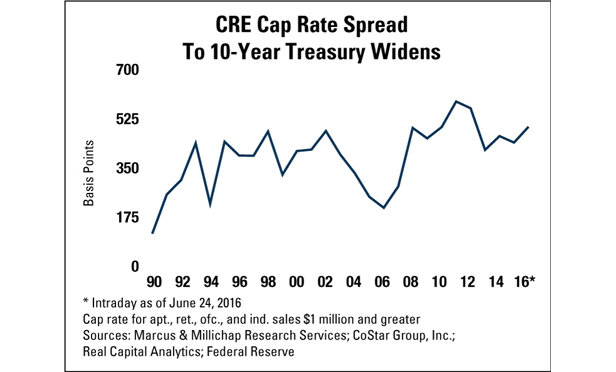CALABASAS, CA—The world reeled after the United Kingdom’s dramatic and largely unexpected vote on June 23 to exit the European Union. The referendum, in the words of Marcus & Millichap researchers, created “uncertainty that induced a sharp decline in global equity markets.” (Marcus & Millichap is a GlobeSt.com Thought Leader.)
In a Special Research Brief, Marcus & Millichap pierces the layers of immediate concern to study the mid- and long-term impact of the move, and comes to the conclusion that downside risk to the US economy and commercial real estate markets is likely to be minimal.
“The UK receives only 3.9% of US exports,” Marcus & Millichap researchers report, “so even a modest British recession resulting from the departure would minimally impact the US economy.” And while the EU as a whole represents about 15% of US exports, “the UK exit is unlikely to spark a substantive economic decline across the remaining 27 members of the union.”
The concentration of global banking firms in London was another potential area of concern, the report states. But this concern was quickly alleviated by worldwide central banks stepping in “to backstop liquidity and reassure markets that banking systems will remain operational.”
Early concerns of which way the vote would go helped prompt the US Fed to hold back on interest rate increases, possibly through September, the report states. And “although lender spreads generally widened in the aftermath of the Brexit vote, interest rates remain highly favorable for investors.” (See accompanying chart.)
The greatest downside risk remains that falling equity markets could create sufficient fear that investors begin a sell-off, similar to what happened at the beginning of the year. These contagion-related fear-induced risks could weaken business and consumer confidence, slowing the economy and creating downside potential for the economy.
It is the expectation as well that US commercial real estate markets will be largely unscathed by the vote, and Marcus & Millichap reports that the apartment sector in particular is coming off a “robust” second quarter. But the outlook for office and retail is cloudier and remains dependent on “how consumers and businesses perceive the news. Should confidence falter, demand for these property types could soften modestly, but restrained construction will remain an important factor supporting the performance of these asset types.”
The US dollar, strengthened against British currency in the aftermath of the vote, can only help imports and therefore, the US industrial sector. But obviously, on the flip side, “potential downsides exist for US manufacturers that export.”
For investors, Marcus & Millichap researchers are predicting greater short-term caution. Projecting into the mid- and long-term, however, the exit could “boost commercial real estate sales. Downward pressure on interest rates will benefit investors, while the appeal of hard assets with favorable yields could draw additional capital to the sector. The depth and duration of volatility surrounding the event will significantly influence the ramifications for investment real estate.”
Taken as a whole, and barring unforeseen setbacks, the UK’s decision to exit the European Union will have few and relatively minor ripple effects in the US, and according to Marcus & Millichap, “the prospects of significant downside risk are limited.”
For the full report, click here.


















 Copyright © 2024 ALM Global, LLC. All Rights Reserved.
Copyright © 2024 ALM Global, LLC. All Rights Reserved.